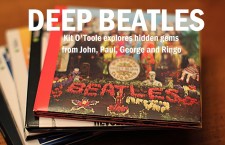The Beatles’ 1965 album Rubber Soul is an embarrassment of riches. In addition to its stellar material, it signaled the final days of Beatlemania and a transition into more experimental sounds and sophisticated songwriting. “Norwegian Wood” most famously embodies these qualities, but other tracks receive fewer accolades, including the catchy yet musically complicated “Wait.” Even more interesting, “Wait” slightly predates Rubber Soul, as the group originally recorded it for the Help! soundtrack. The song proves that the Beatles’ so-called “throwaways” were often some of the most underrated cuts in their vast catalog.
In between filming and other activities, Paul McCartney composed “Wait” while on location in the Bahamas. In Barry Miles’ Many Years from Now, McCartney vaguely recalled writing the track while in the company of Brandon de Wilde, a former child star best known for his Oscar-nominated role in the 1952 classic Shane. As McCartney told Miles, “He was a nice guy who was fascinated by what we did. … We chatted endlessly, and I seem to remember writing ‘Wait’ in front of him, and him being interested to see it being written. I think it was my song. I don’t remember John collaborating too much on it, although he could have.”
Recording began at Abbey Road on June 17, 1965, under the usual guidance of George Martin. McCartney performed vocals and bass; John Lennon assumed the rhythm guitar and vocals; George Harrison took over on lead guitar; and Ringo Starr, of course, played drums. The group recorded four takes, with the last being deemed the best. This initial version lacked tambourine and maracas, and contained less guitar and fewer vocals. Mysteriously the Beatles and Martin then decided to shelve the song, leaving it off the Help! soundtrack. Skip to 7:24 in the video below to hear this early version:
Flash forward to the Rubber Soul sessions later that year: in a hurry to finish the album in time for Christmas sales, the Beatles found themselves short one song for their upcoming disc. Thus they resurrected “Wait” by adding percussion (Lennon played the tambourine while Starr contributed maracas) and guitar parts (courtesy Harrison and volume pedals). Finally, Lennon and McCartney recorded additional vocals for the chorus and bridge, and McCartney laid down another vocal for the song’s conclusion. The duo also performed handclaps to further accent the percussion; all of these revisions made “Wait” better fit the overall tone of Rubber Soul. Once they finished overdubs on November 11, 1965, “Wait” became the fourteenth track on the album.
“Wait” begins abruptly, with Lennon and McCartney’s double-tracked voices displaying their typical tight harmonies. Percussion plays a large role in this track, with the start-and-stop beat reinforced by Starr’s steady drumming and the prominent tambourine and maracas. Due to the subject matter, much of “Wait” is in a minor key, expressing the narrator’s longing and impatience to see his lover again. Tambourine and Harrison’s guitar provide background for the opening lines: “It’s been a long time, now I’m coming back home,” Lennon and McCartney croon. Building the tension, the maracas and drums immediately enter the picture, emphasizing the narrator’s anxiety: “I’ve been away now, oh, how I’ve been alone,” they sing, dropping the key on the word “alone.” The chorus, however, suggests an upbeat tone and possible reunion: “Wait till I come back to your side — we’ll forget the tears we cried.”
The bridge introduces another level of uncertainty, with McCartney’s voice in the forefront: “I feel as though you ought to know, that I’ve been good, as good as I can be,” he posits. “And if you do, I’ll trust in you — and know that you will wait for me.” McCartney’s voice rises on the phrase “wait for me,” hinting at optimism. Unlike a typical love song of this type, the lyrics apparently forecast a less-than-perfect restarting of their love. The lead actor states that he’s been good, but “as good as I can be,” hardly a definitive declaration of his fidelity. Yet the next lines question his lover’s loyalty: has she been faithful? Should the two trust each other? If so, he concludes, she will willingly wait for him. Their relationship, as presented here, appears fragile.
As the song concludes, Lennon and McCartney repeat their opening lines, but slow down on the “I’ve been alone” phrase, with Harrison’s slightly distorted guitar emitting lower notes. In other words, “Wait” does not end with an exciting major chord, providing the listener with a resolution and happy ending. Instead, the Beatles depart with an air of uncertainty, leaving open the question of whether the lovers experienced a happy reunion and continuation of their relationship. Harrison’s volume pedal-enhanced guitar weaves throughout, the somewhat eerie sound underscoring the sense of ambivalence and ambiguity pervading “Wait.”
“Wait” does not represent the first or last time the Beatles revisited the themes of uncertain love and nervous anticipation (see “When I Get Home,” “A Hard Day’s Night,” “Don’t Let Me Down,” “If I Fell,” and “The Night Before,” among many others). However, its instrumentation, harmonies, and opaque lyrics distinguish “Wait” from similar songs, and make it one of the Beatles’ most unfairly overlooked tracks.
- The Rescued Early Paul McCartney Song That Completed ‘Beatles For Sale’ - December 4, 2024
- A Rare Beatles Cover Proves John Lennon Was Wrong About His Voice - November 26, 2024
- How John Lennon Came Roaring Back on the Beatles’ White Album - November 22, 2023



Thanks, that was helpful. I’ve always wondered about the Harrison ending. Those notes denote Ah-ah-men in Jewish liturgy. Coincidental? Do they occur as a conclusion in other places, too? Thanks again.
Interesting, thought, Lawrence. Thanks for commenting!